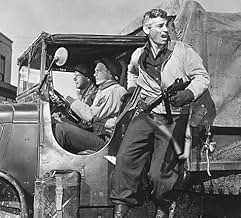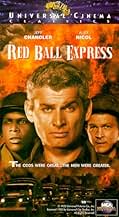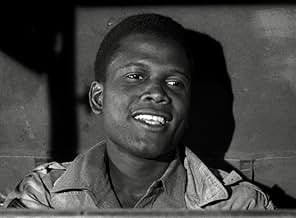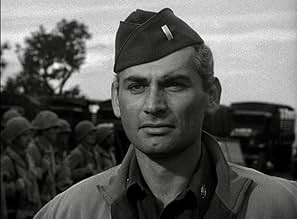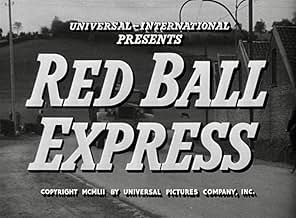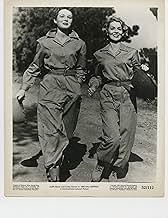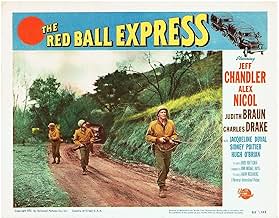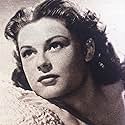IMDb-BEWERTUNG
6,3/10
1011
IHRE BEWERTUNG
Füge eine Handlung in deiner Sprache hinzuStory of the military truck drivers who kept the Allied armies supplied in Europe during World War II.Story of the military truck drivers who kept the Allied armies supplied in Europe during World War II.Story of the military truck drivers who kept the Allied armies supplied in Europe during World War II.
- Regie
- Drehbuch
- Hauptbesetzung
Davis Roberts
- Pvt. Dave McCord
- (as Robert Davis)
Gregg Palmer
- Tank Lieutenant
- (as Palmer Lee)
Douglas Bank
- Mechanic
- (Nicht genannt)
George Barrows
- Soldier in Bistro
- (Nicht genannt)
Nan Boardman
- French Peasant Mother
- (Nicht genannt)
Empfohlene Bewertungen
There is more to war than just the glory boys; 95% of the GIs in WW 2 (and all other wars) are never in the limelight as heroes, but they did more than their fair share of sacrifice. My father was one of those guys. He landed at Normandy, was with the infantry marching to the Hurtgen Forest, and getting overrun in the Battle of the Bulge. He was there for it all. He might not have been a hero in those battles (he was always looking for dry socks), but he was a hero to me. He and thousands of others, such as the men in The Red Ball Express, doing thankless jobs and sacrificing a lot more than just a few days lost sleep. Try driving 30 hours without sleep sometime. An underrated film, very similar to The Sorcerer, and the French film, Wages of Fear, but a bit more traditional. Good viewing.
10ebiros2
I'd have to say that this is a very interesting war time movie. It focuses on not the battle front, but the people who were responsible for the supply line behind the battle front.
The soldiers who are mostly rejects from the battle front are assigned to the Red Ball Express the troops comprising 6000 trucks to bring food, ammunition, and fuel.
This is an innocent looking movie, but it taught me the most important lesson of my life. That everything moves on a commerce. That war is a commerce. It's the delivery of the goods to the points of consumption that is everything. Almost nothing else matters, because if soldiers and tanks didn't have ammo and gas, there's no action. Everything in this world is the same way.
This kind of organized mobility decides the outcome of the war. America had good commander to realize this, and tactical minds to put it into action. Nobody was named a hero, but Patton couldn't have done what he did without the Red Ball Express.
This makes the movie one of the most memorable of all war time movies. I really loved it.
The soldiers who are mostly rejects from the battle front are assigned to the Red Ball Express the troops comprising 6000 trucks to bring food, ammunition, and fuel.
This is an innocent looking movie, but it taught me the most important lesson of my life. That everything moves on a commerce. That war is a commerce. It's the delivery of the goods to the points of consumption that is everything. Almost nothing else matters, because if soldiers and tanks didn't have ammo and gas, there's no action. Everything in this world is the same way.
This kind of organized mobility decides the outcome of the war. America had good commander to realize this, and tactical minds to put it into action. Nobody was named a hero, but Patton couldn't have done what he did without the Red Ball Express.
This makes the movie one of the most memorable of all war time movies. I really loved it.
RED BALL EXPRESS is alright I suppose . It's no masterpiece just a B war movie produced to be shown before a main feature . It involves a bunch of civilian truck drivers drafted into Uncle Sam's army in 1944 and it's those men who keep the allied front lines supplied . It's a rather predictable story of Americans fighting against Germans and where you think the most likable guy in the squad has bought the farm only for them to appear minutes later alive and well . Like I said very predictable
I guess somewhere the producers wanted to point out ( Though this would probably be known to an American audience in 1952 ) why every American war film made at the time always revolved around white American soldiers fighting . This was because the American army was segregated until 1947 and with very few exceptions black Americans didn't serve in the front lines . Despite the producers wanting to speak up fr the Black American war effort it looks painfully dated now since the blacks have lovely singing voices and sing in unison about beating Hitler which comes across as being very stereotypical and highly patronising and I doubt if a studio would be able to get away with this nowadays . Thankfully it serves to remind a wider audience in the 21st Century why war movie GIs are almost always white
I guess somewhere the producers wanted to point out ( Though this would probably be known to an American audience in 1952 ) why every American war film made at the time always revolved around white American soldiers fighting . This was because the American army was segregated until 1947 and with very few exceptions black Americans didn't serve in the front lines . Despite the producers wanting to speak up fr the Black American war effort it looks painfully dated now since the blacks have lovely singing voices and sing in unison about beating Hitler which comes across as being very stereotypical and highly patronising and I doubt if a studio would be able to get away with this nowadays . Thankfully it serves to remind a wider audience in the 21st Century why war movie GIs are almost always white
Partially filmed in Fort Eustis, VA in 1951-52. I was in the army, at Ft. Eustis, waiting for my shipping orders when the cast and crew arrived. Many of us were used as background. Before they left, they gave us a special screening with most of the actors attending. Jeff Chandler was there. I met one of the actresses, who was with the cast, but not in the picture. We had some nice chats; I saw her off when they departed. I was 12 when world war II started and all of the war films were in black and white. Even the news was in black and white. I feel that black and white and war go together. There is nothing pretty about war. All wars are, more or less, the same; why should the films be any different?
The story was inspired by events in Louis L'Amour's life when he served in the European campaign. Louis L'Amour for those who may not know was a prolific writer of Westerns and single-handedly reinvented that literary form.
He told his WWII tales at the Brown Derby on Vine Stree in Hollywood. Louis often met with Cobb who ran the place. They often spoke of American Natives especially the Crow Indians in Wyoming and Montana. In any case, someone overheard Louis's WWII tales and it became this film.
I don't know if Louis L'Amour was ever credited. I don't think so. Much of this author's early life could easily serve as an exciting source of several entertaining and illuminating films.
He told his WWII tales at the Brown Derby on Vine Stree in Hollywood. Louis often met with Cobb who ran the place. They often spoke of American Natives especially the Crow Indians in Wyoming and Montana. In any case, someone overheard Louis's WWII tales and it became this film.
I don't know if Louis L'Amour was ever credited. I don't think so. Much of this author's early life could easily serve as an exciting source of several entertaining and illuminating films.
Wusstest du schon
- WissenswertesLouis L'Amour's memoir, "Education of a Wandering Man", said this movie was actually based on his own war-time anecdotes. He was awarded two Bronze Star Medals while serving as an officer with the Red Ball Express.
- PatzerThe real Red Ball Express operated two separate roads for traffic (one going to the front and one for returning empty) Two-way traffic on a single road, as shown in the film , never occurred.
- Crazy CreditsNo credits besides the title, seven minutes in the film.
- VerbindungenFeatured in Budd Boetticher: A Man Can Do That (2005)
Top-Auswahl
Melde dich zum Bewerten an und greife auf die Watchlist für personalisierte Empfehlungen zu.
- How long is Red Ball Express?Powered by Alexa
Details
- Laufzeit1 Stunde 23 Minuten
- Farbe
- Seitenverhältnis
- 1.37 : 1
Zu dieser Seite beitragen
Bearbeitung vorschlagen oder fehlenden Inhalt hinzufügen

Oberste Lücke
By what name was Unternehmen Rote Teufel (1952) officially released in India in English?
Antwort
